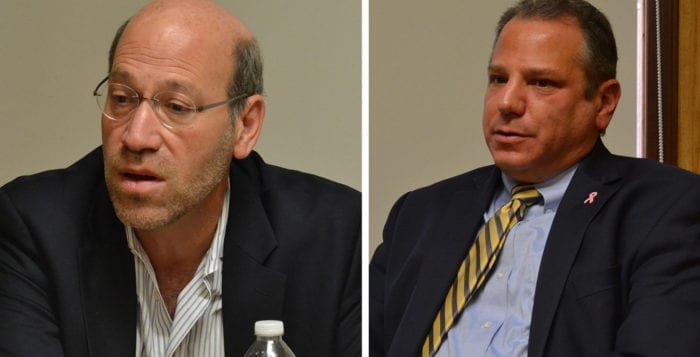Raia, Rosen face off for 12th Assembly District seat
Both candidates seeking to represent New York State’s 12th Assembly District are aware of the challenges the area faces, but have key differences on the solutions they propose.
Incumbent Andrew Raia (R-East Northport) was elected to represent the 12th District in 2002 and seeks to return to Albany for his ninth term.
His Democrat challenger is Avrum Rosen, an attorney specializing in bankruptcy and tax law at his Huntington-based practice.
Rosen jumped into the race after New York State Supreme Court’s Appellate Division ruled Aug. 22 that Northport resident Michael Marcantonio, 31, Raia’s original challenger, did not meet the state’s minimum five-year residency requirements.
“When Michael Marcantonio got thrown out this race, I decided someone had to step up,” Rosen said. “While I like [Raia] very much, I don’t like his position on a lot of things. This is not a year when any Republican should go unchallenged in an election.”
LIPA/Northport power plant
Long Island Power Authority’s tax certiorari lawsuit against the Town of Huntington and Northport-East Northport school district over Northport Power Station is a top concern of district residents as mediation begins and possible court trial looms.
“There was never any pressure on [LIPA] to upgrade, do any of the things they needed to do to make it what it should have been,” Rosen said.
Rosen suggested the state should allow town officials to levy a carbon tax against the Northport power plant to encourage LIPA to upgrade it, ultimately raising the value of the plant.
Raia highlighted legislation he co-sponsored earlier this year that would allow the town to spread out any tax rate changes over a 15-year period and granted access to state funds to stabilize taxes. Raia said environmentalists rallied against it for proposing to take money from the greenhouse gas initiative funds.
“No matter who comes back, it’s something that should be reintroduced and maybe we get the money from another pot that the environmentalists are not so concerned about,” the incumbent said.
Taxes
Raia said he believes the 2 percent state-mandated tax cap has been one the “best things” the state has done to control taxes and cost-of-living on Long Island. He wants to encourage consolidation of services among municipalities and school districts while supporting the lawsuit of Gov. Andrew Cuomo (D) against the federal government for placing a $10,000 cap on state and local tax deductions. Raia said he has researched shifting from a property-based to income-based tax model, creating a commercial tax fund and other ways to ease the burden on Long Island homeowners.
Rosen agreed with his opponent that the SALT tax deduction cap needs to be addressed by the state. If elected to office, he proposes the state Legislature considers offering straight tax credits to those with student loans, those entering STEM professions and for parents paying childcare costs. The Democratic challenger said commercial taxes need to be addressed and he believes it needs to be done through a tristate regional approach that brings both New Jersey and Connecticut on board. Rosen questions if the 2 percent state-mandated tax cap can be kept in place in the future if the rate of inflation increases.
Gun Control
Since the shooting at Marjory Stoneman Douglas High School in Parkland, Florida, this February, gun control has become a larger national issue.
Rosen said he is in favor of microstamping guns, broader background checks and a red flag law that allows police or family to request firearms be removed from owners who might present a danger to themselves or others. He criticized Raia for voting down gun control measures in the past.
The incumbent said over time he has “evolved on the issue,” arguing against parts of various gun control bills for lacking due process. Raia cited that he voted in favor of taking firearms from those convicted of domestic violence once the language was tweaked to only include related crimes, and he wanted to enable investigators charged with researching the mental health backgrounds of those requesting gun permits to cross state lines.







